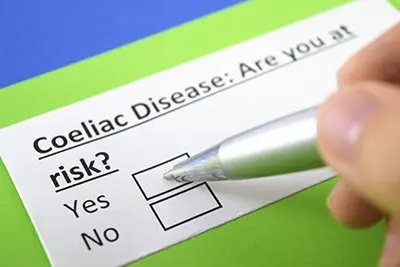
Coeliac Disease Blood Test
Want to know if you have coeliac disease (celiac disease)? Take a coeliac disease blood test to find out.
Coeliac (celiac) testing is quick and easy. All you need to do is take a finger-prick blood sample and return it using the prepaid envelope. Your sample will be analysed by our UKAS-accredited lab partner (who also test for the NHS) and you'll get your coeliac blood test results and doctor's report in days.
- Results and doctors report in 3 days or less.
- Free, next-working day delivery
- Approved coeliac antibody test
£47.00

Personalise your coeliac blood test
You can choose how you'd to collect your blood sample. You may also want to add to your test panel depending on your age, sex and any symptoms.
Finger-prick blood collection
Use our simple kit to collect a blood sample from your finger at home.
Visit a clinic to have your blood taken
Arrange for a venous blood draw yourself

Dr Claire Merrifield
GP & PhD
our medical director
What you need to know about our Coeliac Disease Blood Test

Dr Claire Merrifield
GP & PhD
our medical director
Our Coeliac Disease Blood Test is a comprehensive antibody test that's recommended for diagnosing coeliac disease. The test is fast, accurate and you get a doctor's report explaining exactly what your results mean.
The bottom line is that if you want to know if you have coeliac disease, this is the blood test you need.
What is coeliac disease?
Coeliac disease affects about 1-in-100 people but most don't know they've got it. Although some people refer to coeliac disease as "gluten allergy", coeliac disease is actually an autoimmune condition, not an allergy. This means that coeliac diseased is caused by your immune system reacting against your own body. In coeliac disease, a substance called gluten triggers your immune system to attack the lining of your gut, causing inflammation and gut symptoms. Gluten itself is harmless, it's the body's reaction to it that causes a problem. Gluten is found in wheat, barley and rye so you'll find it in bread, pasta, cakes and even beer.
Coeliac symptoms?
Our coeliac blood test is for you if you have been experiencing any of the following symptoms commonly associated with coeliac disease:
- Stomach pain and cramping
- Nausea and vomiting
- Bloating
- Diarrhoea
- Tiredness
- Weight loss
- Skin rashes
You can also have these symptoms after eating gluten without having coeliac disease. This is called non-coeliac gluten sensitivity. The main way to tell the difference between Coeliac Disease and non-Coeliac gluten sensitivity is to take a Coeliac Disease test.
Lastly, it's important to know that a third of people with coeliac disease don't have any symptoms. This is called "silent-coeliac disease".
What does our Coeliac Disease Blood Test check for and why?
Our Coeliac Disease Blood Test is a simple finger prick blood test checking for tissue transglutaminase IgA antibodies. This test is recommended by the NHS and raised levels of tissue transglutaminase IgA antibodies make it likely you have coeliac disease.
If we suspect coeliac disease based on tissue transglutaminase levels, we'll go on and test for another antibody that's raised in coeliac disease, anti-endomysial antibodies, to confirm the diagnosis.
Some people don't make IgA-type antibodies at all. Our test can pick this up and we'll automatically test for a different type of antibody that's raised in coeliac disease, deamidated gliadin peptide IgG.
To summarise, we test for the following in our Coeliac Disease Blood Test:
- Tissue transglutaminase IgA (TAA) antibodies in everyone
- Total IgA antibodies if your TAA level is low
- Deamidated gliadin peptide IgG antibodies if you're IgA deficient
- Endomysial IgA antibodies if your TAA level is elevated
What do the coeliac blood test results mean?
The coeliac disease blood test checks your levels of tissue transglutaminase IgA (TAA) antibody.
| TAA Level (IU/ml) | Meaning |
| < 0.3 | Possible IgA deficiency. We'll go on and test your total IgA levels and deamidated gliadin peptide antibodies if necessary. |
| 0.3 - 6.9 | Normal: coeliac disease very unlikely |
| 7-10 | Borderline. Coeliac disease possible, we'll go on and test your anti-endomysial IgA antibody levels for further information. |
| > 10 | Positive. Coeliac disease likely, we'll go on and test your anti-endomysial IgA antibody levels to confirm. |
If the test result is negative, but you still get symptoms when eating gluten, then you may have non-coeliac gluten sensitivity.
What's the difference between coeliac disease and gluten intolerance?
Coeliac disease is an autoimmune reaction to gluten characterised by inflammation in the bowel. However, some people complain of gut symptoms when eating gluten but have no inflammation in the bowel. This is "gluten intolerance" or "non-coeliac gluten sensitivity". The only way to tell the difference between non-coeliac gluten sensitivity and coeliac disease is to take a coeliac disease test.
What's tested in your Coeliac Disease Blood Test?
Our coeliac test is a fully comprehensive multi-step panel including free confirmatory testing so you can have full confidence in your results.
Please note that you need to have had gluten in your diet in the 6 weeks before testing for coeliac disease blood tests to be accurate.
- Tissue transglutaminase IgA antibodies
This is the gold-standard, NHS-approved blood test for coeliac disease. We measure this in all cases.
- Total IgA antibodies
If your tissue transglutaminase IgA level is low, we'll go on and test your total IgA antibody level to make sure you produce this type of antibody.
- Deamidated gliadin peptide IgG antibodies
If you're found to be IgA deficient, we'll go on and test your deamidated gliadin peptide IgG antibody levels which can indicate coeliac disease.
- Endomysial IgA antibodies
If your tissue transglutaminase level is high, we'll go on and test your endomysial antibody levels to confirm that coeliac disease is highly likely.
The test for coeliac disease will not be accurate if you do not have gluten in your diet. Make sure your diet contains wheat, barley or rye in the 6 weeks before testing for accurate results.
Children may struggle to use a finger-prick collection kit. All children will need to be supervised / helped by an adult when using the finger-prick blood collection kit.
If you're not able to eat any gluten at all because of symptoms then this test won't be as accurate in detecting coeliac disease.
If you're unsure if you should use this test panel, please contact us for advice.
Coeliac disease is an automimmune condition, meaning that your body creates an immune response against your own cells. This autoimmune reaction is triggered by gluten. However, we're not 100% sure what causes some people to have coeliac disease while most don't. We do know that it's associated with certain genes. People with coeliac disease will have one of three types of HLA gene: HLA-DQ 2.5, HLA-DQ 8 or HLA-DQ-2.2. However, around 40% of people have one these HLA types but only 1% of people have coeliac disease. This means that environmental factors - e.g. diet or infections - are probably also important.
The main treatment for coeliac disease is to avoid gluten by following a "gluten-free diet". This generally involves foods that contain wheat, barley or rye.
If someone with coeliac disease eats gluten, it will trigger an autoimmune reaction causing inflammation in the small bowel and potentially elsewhere in the body.
This can have lots of effects such as bowel symptoms, failure to absorb nutrients leading to deficiencies, infertility, nerve problems and even an increased risk of cancer. This is why it's so important to diagnose coeliac disease. Unfortunately, 75% of people with coeliac disease don't know they have it.
Yes, celiac disease is just the American spelling of coeliac disease. Unfortunately, many people refer to coeliac disease by incorrect terminology such as "gluten allergy" or "gluten sensitivity". These can be misleading so it's best to stick to coeliac disease.



